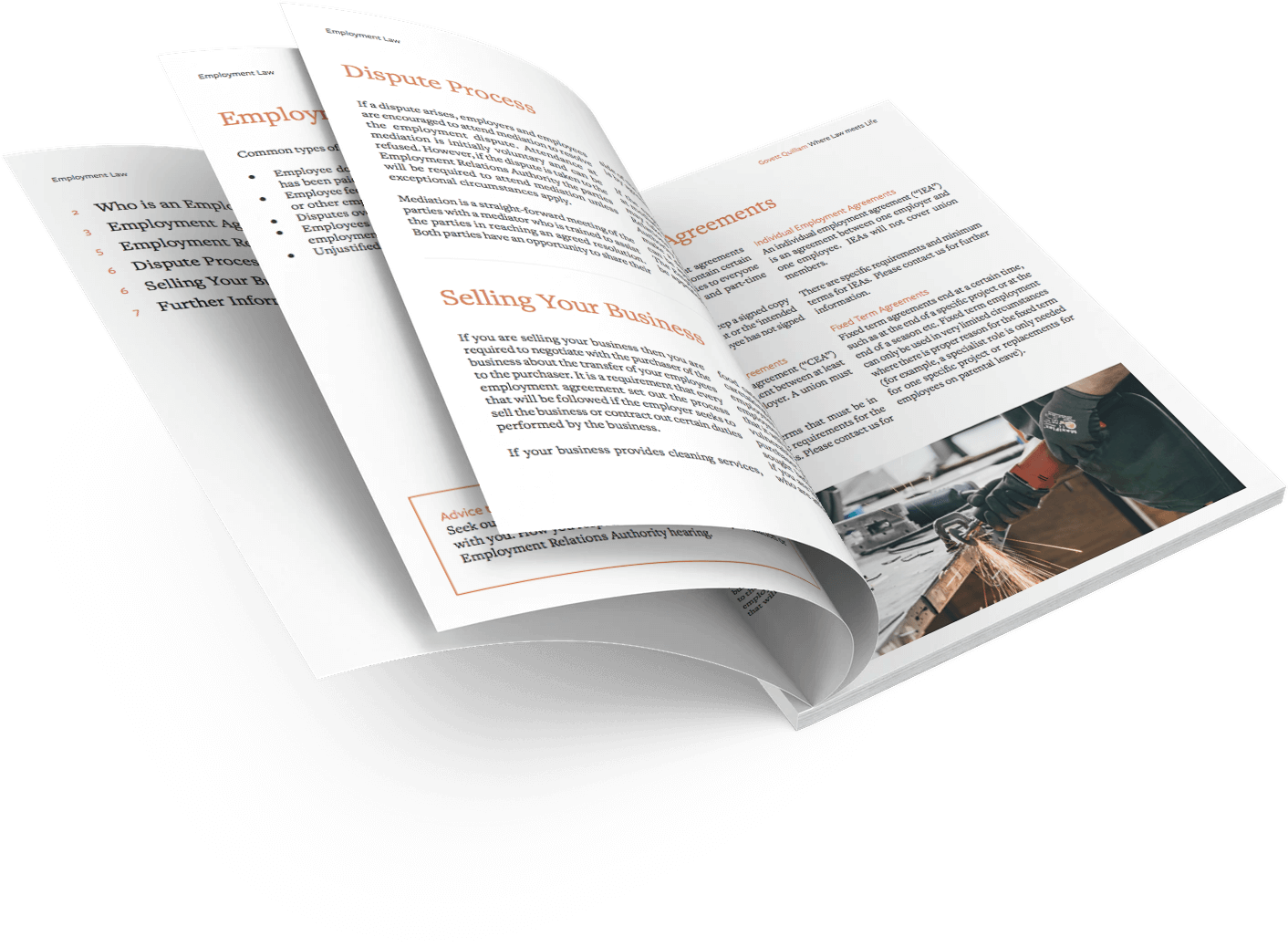
In the past few months there have been plenty of rapid developments in relation to COVID-19 and employment law, including the country moving into the COVID-19 Protection Framework (traffic light system). We answer some commonly asked questions...
For businesses covered by a Government vaccination mandate:
- Can an employee within an industry where the Government has mandated vaccination be provided alternative duties that aren’t public facing with little to no employee contact?
Generally, a worker in these specified industries must not carry out work at these businesses unless they are vaccinated. This applies regardless of the worker’s duties, whether their job is public-facing, or they have very little employee contact. - Can a café/restaurant/bar which has outdoor seating space allow unvaccinated people to sit outside and be served (with masks and 1m social distancing), provided they don’t enter inside the premise?
A food business or service that requires My Vaccine Pass ('MVP') must have systems and processes in place to ensure, so far as reasonably practicable, that no unvaccinated customers enter the workplace except to the minimum extent necessary to collect goods through a method that minimises physical contact.
For a food business or service requiring MVP, it is likely that outdoor premises would be considered to be part of the ‘workplace’, and therefore unvaccinated people would not be allowed to sit outside and be served at the premises.
For businesses that are not covered by a Government vaccination mandate:
- If a risk assessment identifies high risk/vulnerable people included in your staff, who will be working in close proximity to other staff, can you require all staff to be vaccinated to protect these vulnerable staff members?
If having high risk/vulnerable people included in your staff is a consideration that leads to your risk assessment for a particular role being identified as high risk, then you should consider whether it is reasonable to require the role be performed by a vaccinated person. If each role in your workplace is assessed as high risk, and it would be reasonable to require vaccination, you are allowed to require all staff to be vaccinated. - If a business has decided it does not want to make vaccines mandatory for staff or customers, but is aware that one staff member is unvaccinated, and some other staff members have raised concerns about working with the unvaccinated staff member, what process should the business follow?
An employer should conduct a work risk assessment in regard to the transmission of COVID-19 using the risk assessment tool provided by the Government. If the employer decides to conduct a risk assessment, they must complete it with employees and their representatives.
Following a fair process during the risk assessment process may mean exploring the reasons for an employee’s refusal to be vaccinated, allowing the employee opportunities to respond, taking an employee’s submissions and suggestions into consideration, and considering alternative working arrangements.
- If an unvaccinated employee is doing a job that does not involve contact with other people (e.g. a lone worker), does an employer have the right to request this employee to get a vaccination?
An employer may conduct a risk assessment of the work this worker does to ascertain whether it is reasonable for the employer to require the worker’s role be carried out by a vaccinated person only. This assessment should be focused on the work being done in that role.
If risk ratings from the risk assessment tool show that the risk is high (3 out of 4 questions answered yes) then it is reasonable for the employer to require the work is done by a vaccinated person only. However, if it is clear that the risk of infection and transmission is no higher than when the worker is outside of work, it is generally not reasonable to require that work be done only by those that are vaccinated.
Other questions:
- What is the exemption process for those unable to have the vaccine?
In relation to the specific individual, a suitably qualified medical practitioner may apply to the Director-General for a COVID-19 vaccination on behalf of a person who is not vaccinated and is required to be vaccinated under the Order.
An application must be accompanied by a certificate signed by a medical practitioner stating that the medical practitioner has reviewed the person’s medical history and assessed their health, and that they have reasonable grounds for believing that the person meets the COVID-19 exemption criteria.
The Director-General may grant the application if the Director-General is satisfied that the person meets the exemption criteria. - Is an Airbnb considered an “accommodation service” for the purposes of the COVID-19 Protection Framework?
An Airbnb would generally fall under the definition of “accommodation service” under the Protection Framework Order, as it is accommodation provided by a business or service in which multiple groups of 1 or more residents share facilities or common areas. The host of an Airbnb makes money from guests so they would be classified as a business. Therefore an Airbnb may open at green, orange, or red, and vaccine passports are not required to be used (although the Airbnb host may chose to require guests to show vaccine passports).
Workers and contractors to accommodation services are not required to be vaccinated under the Vaccinations Order. However, the Airbnb host may conduct a risk assessment to determine which roles should be conducted by vaccinated people. - Can venues switch between hosting vaccinated groups and unvaccinated groups?
Locations and venues holding gatherings (rather than events) can switch between requiring MVP and not requiring it at red, orange and green settings. For example, each gathering has the venue for an allocated time slot. A gathering not using MVP must adhere to the required social distancing and capacity rules under the relevant traffic light setting.
If a business is switching between requiring MVP and not requiring MVP, there must be no mingling of gatherings. The area should be well ventilated and high-touch surfaces, such as door handles, should be cleaned between groups. Everyone, both staff and visitors, must be told what the MVP requirements are for the gathering.
For further information or assistance with navigating your employment law needs, please contact our Employment Team.
Our employment specialists:
 Troy Wano
Troy WanoPartner
Troy has an extensive background in employment law and has regularly appeared in the Employment Relations Authority and the Employment Court. He also advises on day-to-day employment issues, developing employment policies and agreements, implementing disciplinary procedures (and conducting disciplinary meetings and investigations).
troy.wano@gqlaw.nz | (06) 768-3710
 Jaye Atkin
Jaye Atkin
Lawyer
Jaye joined Govett Quilliam in November 2020 after completing her law degree at the University of Canterbury. Jaye practises primarily in the areas of employment law and civil litigation, as well as resource management and environmental planning.
jaye.atkin@gqlaw.nz | (06) 768-3907






.png)

